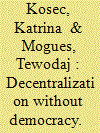| Srl | Item |
| 1 |
ID:
165403


|
|
|
|
|
| Summary/Abstract |
Political competition is widely recognized as a mediator of public goods provision through its salutary effect on incumbents’ electoral incentives. We argue that political competition additionally mediates public goods provision by reducing the efficiency of legislative bargaining. These countervailing forces may produce a net negative effect in places with weak parties and low transparency—typical of many young democracies. We provide evidence of a robust negative relationship between political competition and local public goods using panel data from Mali. Tests of mechanisms corroborate our interpretation of this relationship as evidence of legislative bargaining inefficiencies. To explore the generalizability of these findings, we analyze cross-country panel data and show that political competition leads to better (worse) public goods provision under high (low) levels of party system institutionalization. The paper sheds light on why political competition is only selectively beneficial, and underscores the importance of considering both the electoral and legislative arenas.
|
|
|
|
|
|
|
|
|
|
|
|
|
|
|
|
| 2 |
ID:
173005


|
|
|
|
|
| Summary/Abstract |
Increasingly, decentralization is being adopted by countries in which assumptions made by formal models of decentralization, such as electoral accountability and population mobility, fail to hold. How does decentralization affect public service delivery in such contexts? The authors exploit the partial rollout of decentralization in the autocratic context of Ethiopia and use a spatial regression discontinuity design to identify its effects. Decentralization improves delivery of productive services, specifically, agricultural services, but has no effect on social services, specifically, drinking water services. This finding is consistent with a model in which local leaders have superior information about the public investments that will deliver the greatest returns and they are incentivized by decentralization to maximize citizens’ production—on which rents depend—rather than citizens’ utility. These findings shed light on nonelectoral mechanisms through which decentralization affects public goods provision and help to explain decentralization’s mixed effects in many nondemocratic settings.
|
|
|
|
|
|
|
|
|
|
|
|
|
|
|
|